
November 13, 2023
Attack on Titan Historical Parallels | Real-Life References in AoT
Examining the historical references of real life in Attack on Titan and highlighting its powerful message against oppressive regimes. Check it out!

 >
>Buy: Attack On Titan Merchandise & Gifts
Buy: Attack On Titan Merchandise & Gifts
Table of Contents +
Attack on Titan distinguishes itself from other fictional stories by delving into various serious and real themes. Hajime Isayama, the creator of the series, enhances the anime's depth by incorporating historical parallels from one of the most tumultuous periods in modern history—World War II.
Whether it’s the nation of Marley and their inhumane treatment of the Eldians or Eren’s plan of world annihilation, the show draws striking parallels to real-life events.
No Freedom and Harsh Punishments
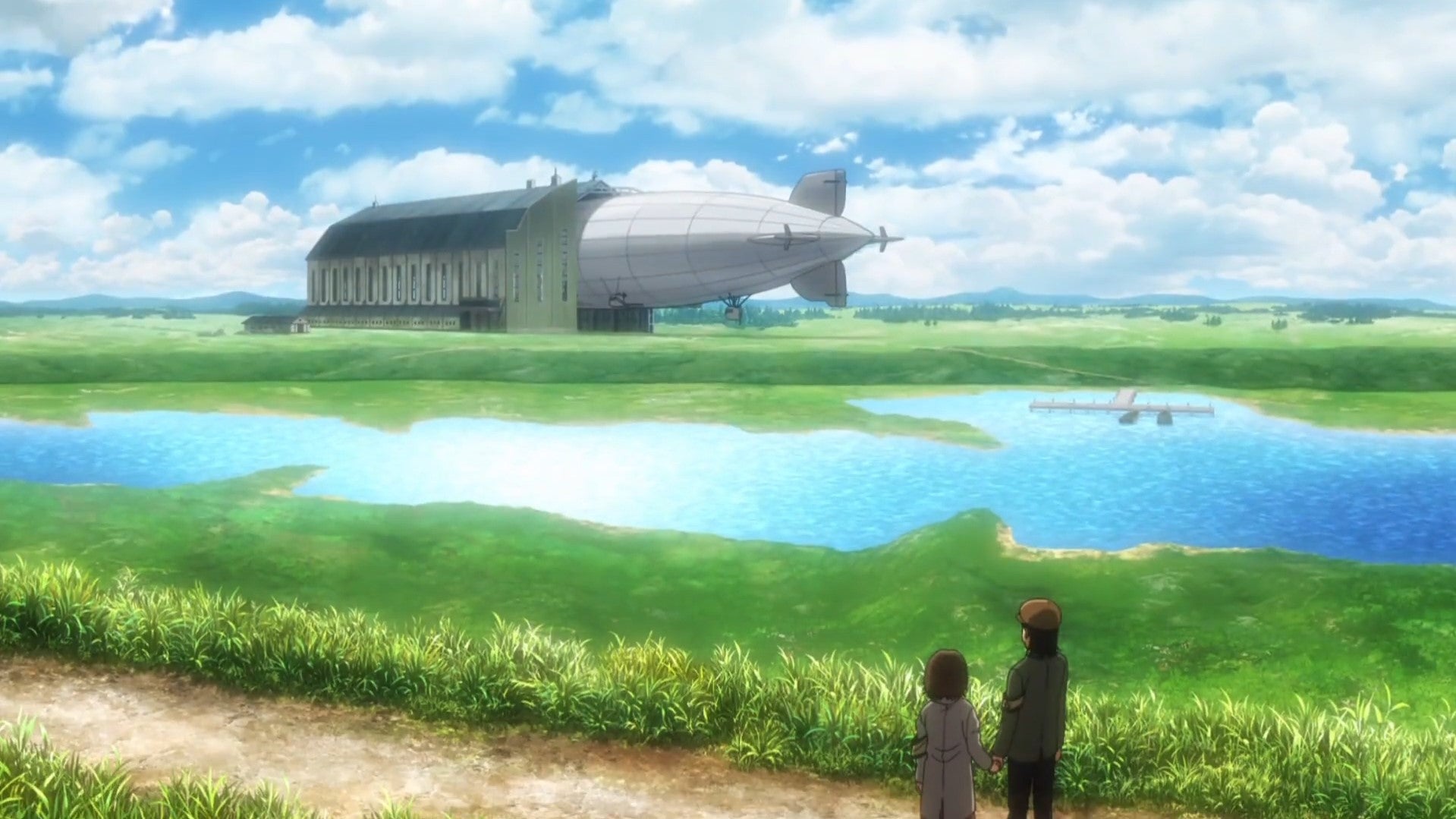
Under Marley's oppressive rule, Eldians within their borders faced severe consequences for even minor misdemeanors, relegating them to a status akin to second-class citizens. A significant example of this oppression occurred when Grisha and his sister ventured beyond the restricted area to explore the city and admire the majestic zeppelins.
On that decisive day, Marleyan soldiers unjustly and ruthlessly punished Grisha for his actions. Despite the pure and innocent intentions behind their outing, they subjected the boy to a brutal beating and tragically took his sister's life. Unfortunately, such inhumane behavior by the Marleyans was not an isolated incident but rather a recurring pattern of oppression against the Eldians.
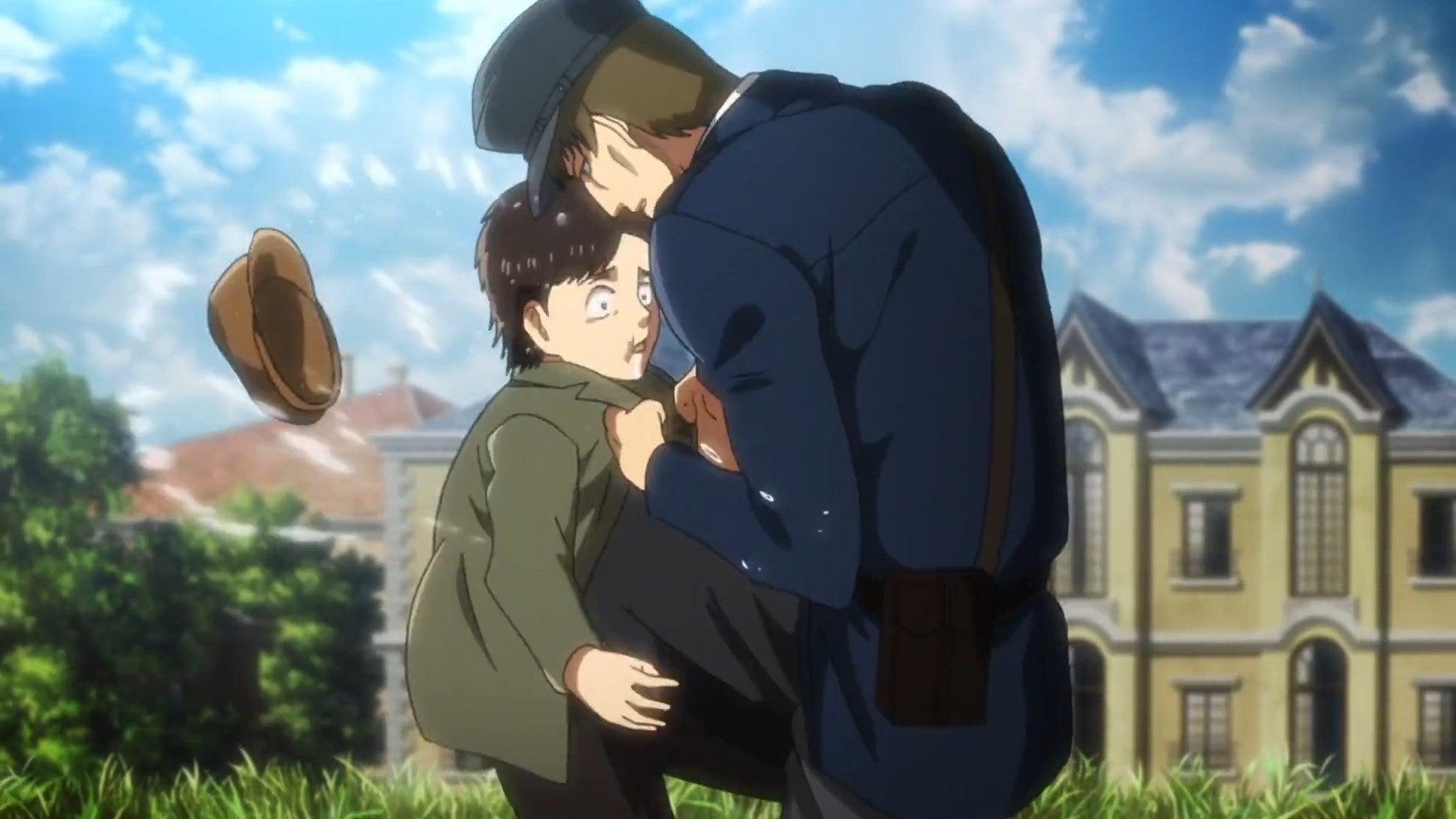
This mistreatment draws historical parallels, notably to the fascist regime of Nazi Germany, where even a simple joke or criticism about the government often resulted in severe punishments, reflecting the tyrannical actions witnessed under Marley's rule. Similar to Marley, the Nazi authorities exhibited a comparable disdain for dissent. The ongoing persecution of individuals who deviated from the established narrative in Nazi Germany aligns with the parallel of Marley's harsh treatment of Eldians seeking to exercise their fundamental human rights, such as the innocent act of viewing zeppelins.
Propaganda and False Teachings
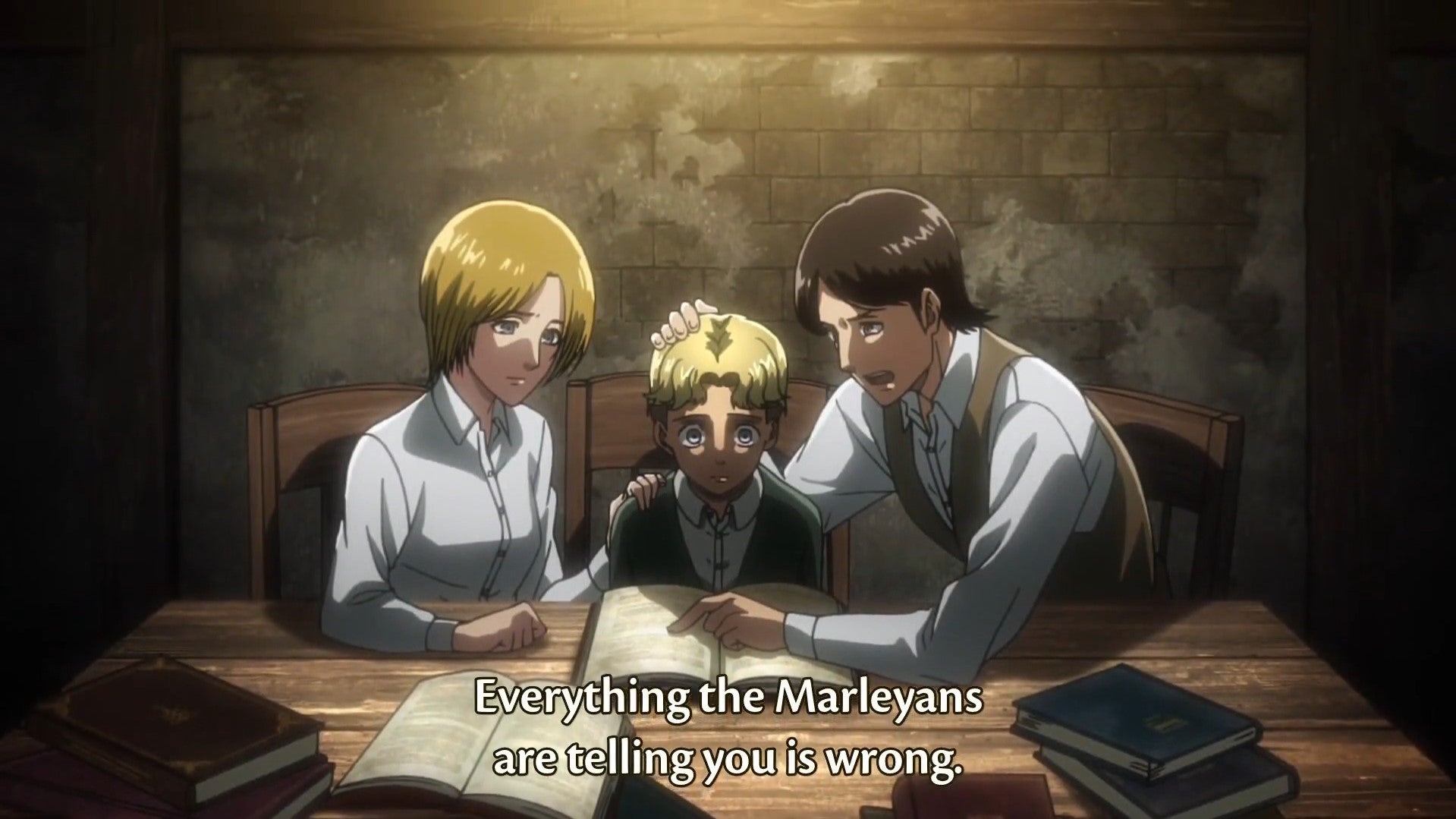
The Marleyan schools and families ingrained a strong bias in their children, fostering a collective mindset that championed their nation. Each child underwent a form of indoctrination, being taught a distorted version of reality and history where Marley assumed the role of the historically oppressed nation, while Eldians were unjustly portrayed as oppressors and enemies deserving elimination.
These children were subjected to the injection of hateful thoughts, shaping their perspectives to view Eldians as inferior beings, or sometimes as non-humans entirely (often referring to Eldians as "Devils"). By employing this approach, Marley ensured the cultivation of unwavering loyalty among its citizens, diminishing the likelihood of betrayal or a change in allegiance.
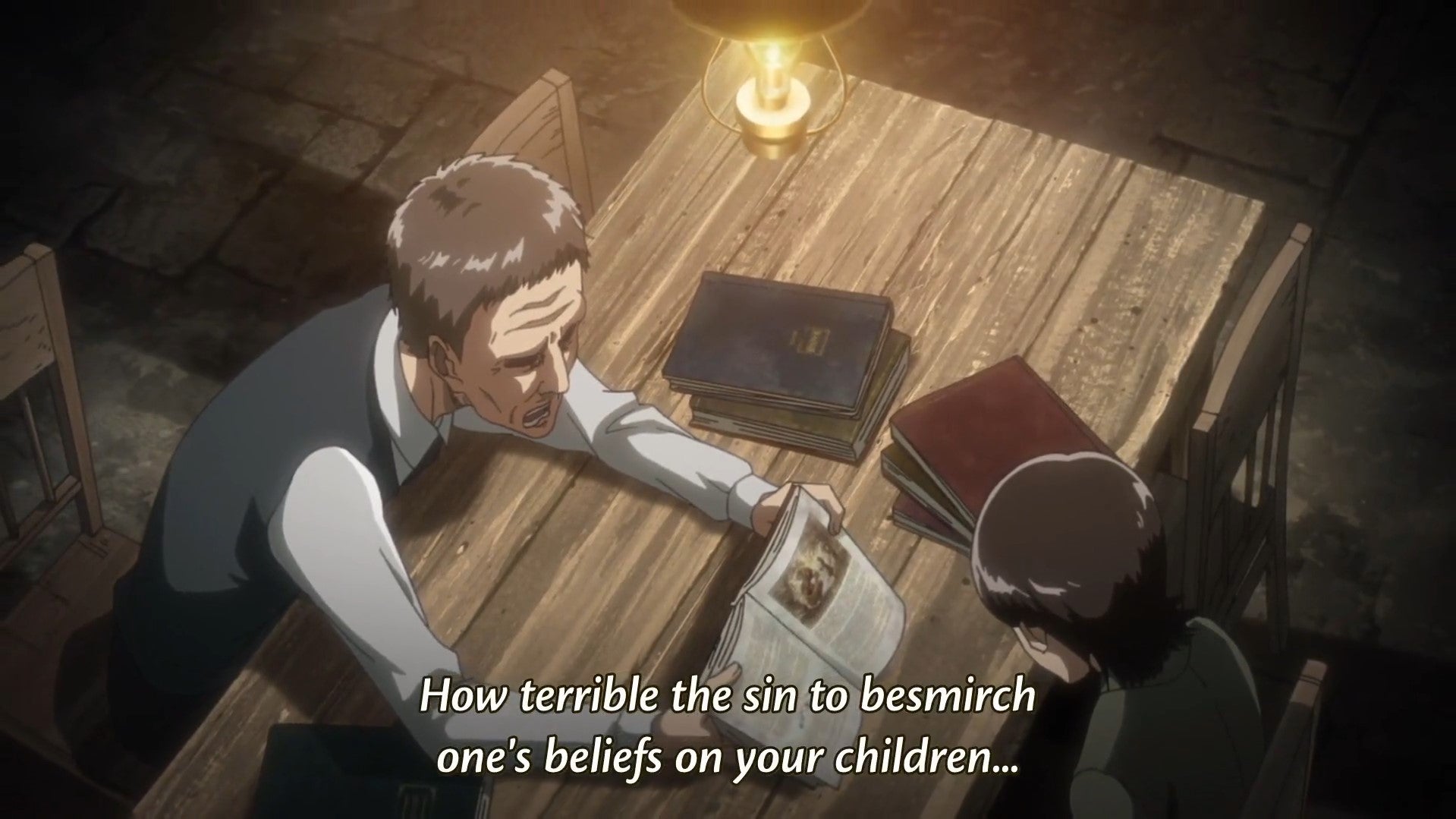
This mentality and imposition of beliefs draw strong parallels to the era of Nazi Germany, a historical period that heavily influences Hajime Isayama's narrative. During that time, widespread propaganda targeted and degraded the Jewish people, instilling a deep-seated hatred in almost every German individual and fueling their fervor to obliterate the targeted people.
Eldians’ Armbands
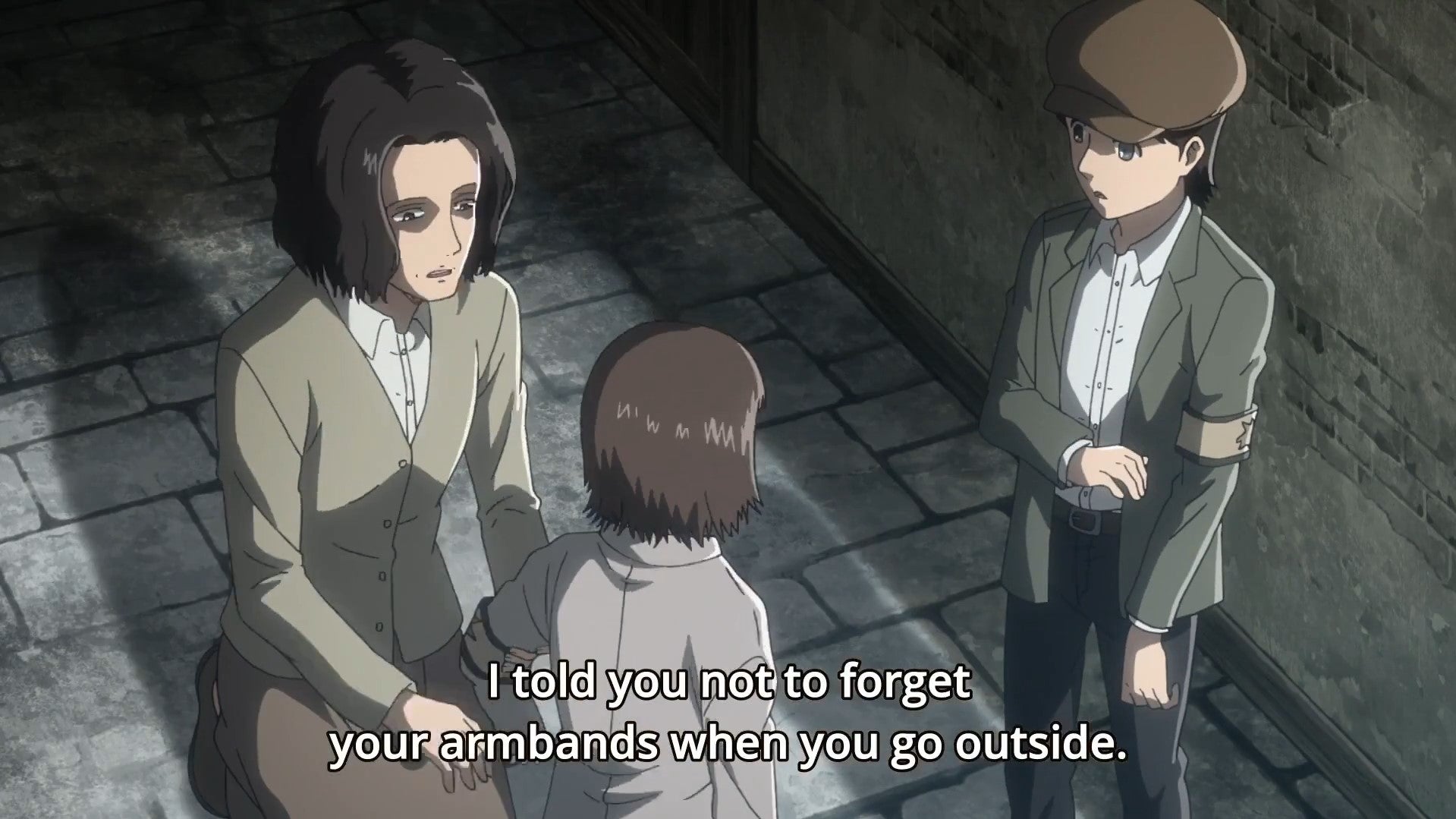
Every Eldian within Marley's borders was required to wear an armband, a visual marker of their nationality. The majority of Eldians resided in lower-class neighborhoods, where their rights were significantly fewer than those of Marleyans, enduring treatment that surpassed the hardships faced by the Marleyan population.
To maintain the purity of Marleyan blood, any intimate or similar relationships between Marleyans and Eldians were strictly prohibited, with severe consequences awaiting those caught in such associations. Reiner's parents, living in constant fear of their Marley x Eldian relationship being exposed by the government, serve as a poignant example of this policy.
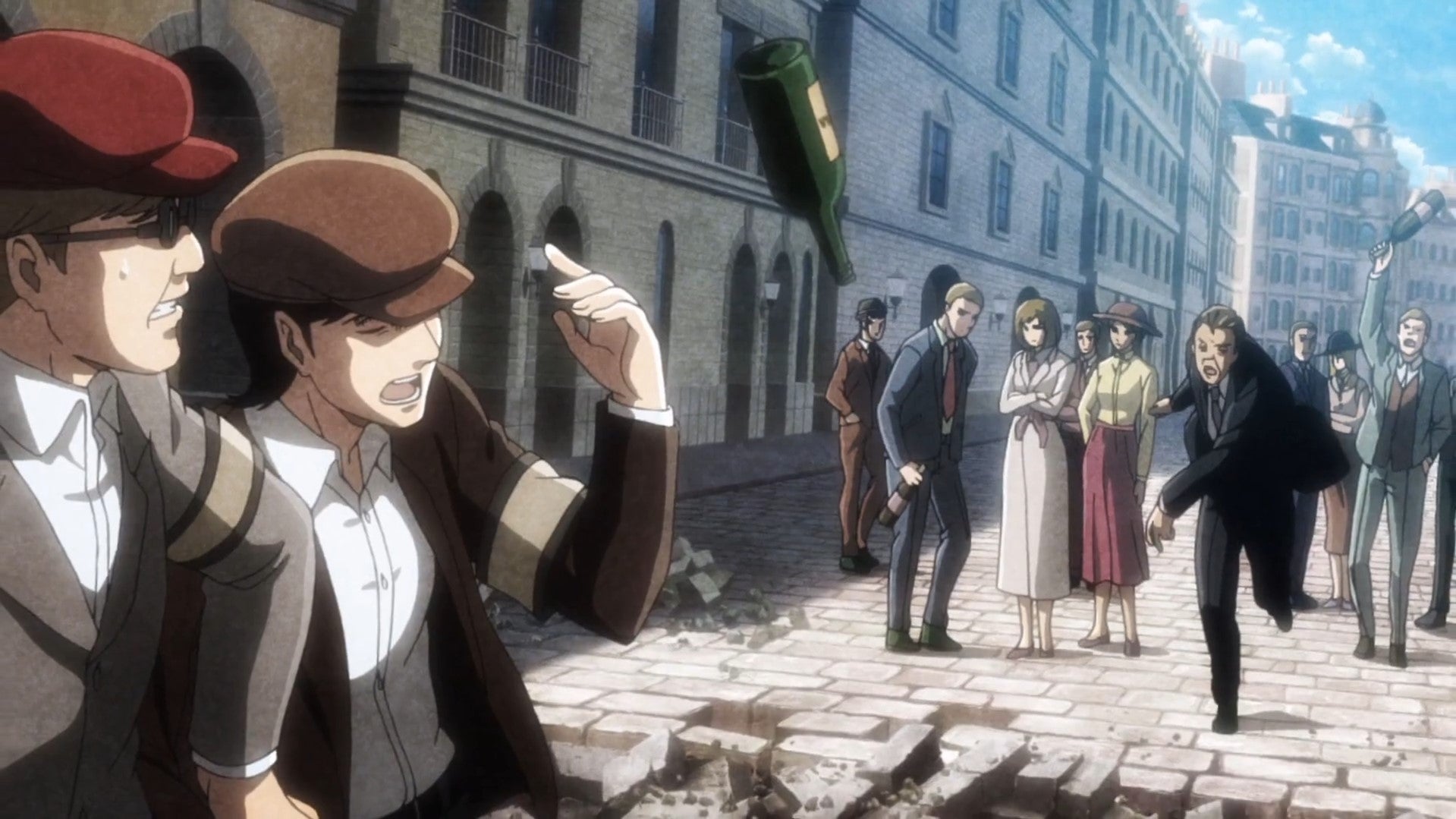
Much like the Marleyans in Attack on Titan, the Nazi German government embraced similar principles of segregating peoples, notably forcing the Jewish population into ghettos. Nazi Germany ardently propagated the belief in the innate superiority of their nation and Aryan peoples over all others, implementing cruel policies that systematically oppressed the Jewish population. As part of these policies, Jews were mandated to wear an armband adorned with a yellow Star of David, symbolizing their Jewish nationality and origin.
Hajime Isayama's parallel in this context is remarkably direct in Attack on Titan, illustrated by the use of a similar armband adorned with a yellow star (or, in the case of an Honorary Marleyan, a red armband).
Honorary Marleyans
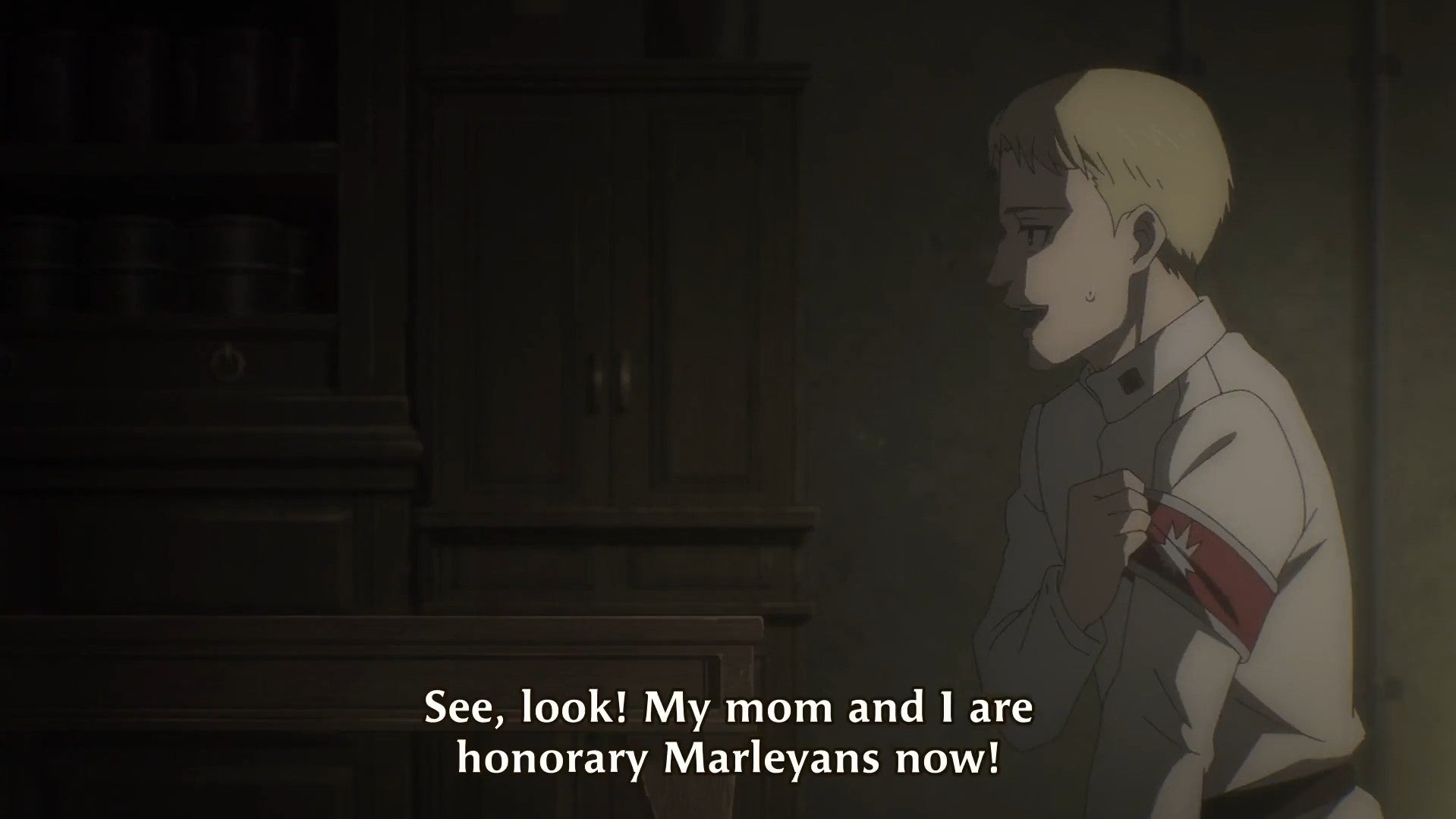
Not every Eldian in Marley faced persecution; a select few enjoyed a higher status. These exceptions were uncommon and earned their place through factors like wealth, military service, or the potent advantage of possessing one of the Nine Titans.
Within the Titan-possessing community, there were two distinct groups. The first comprised soldiers like Reiner and Falco, who served in the military. The second, exemplified by the Tybur Family, held an elevated status. Beyond just owning the War Hammer Titan, their wealth and historical significance from the Great Titan War granted them substantial influence in Marley, solidifying their position as one of the most important noble families.
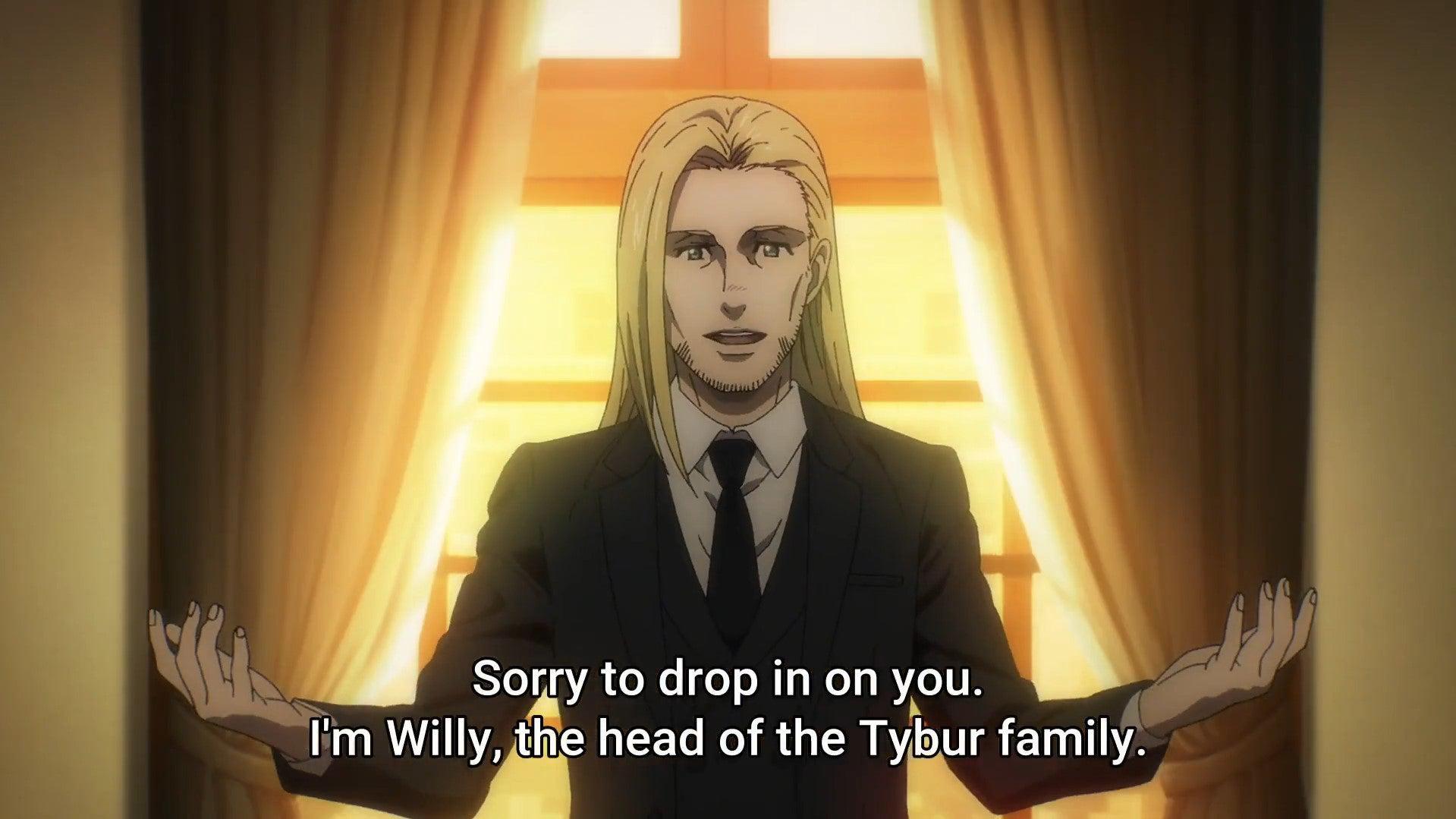
Similarly, during Nazi Germany, certain Jewish individuals were granted exemptions or privileges in exchange for collaboration or specialized services to the regime. Instances arose where Jews were temporarily spared from persecution in return for assisting the Nazis; these instances were rare though.
The Rumbling
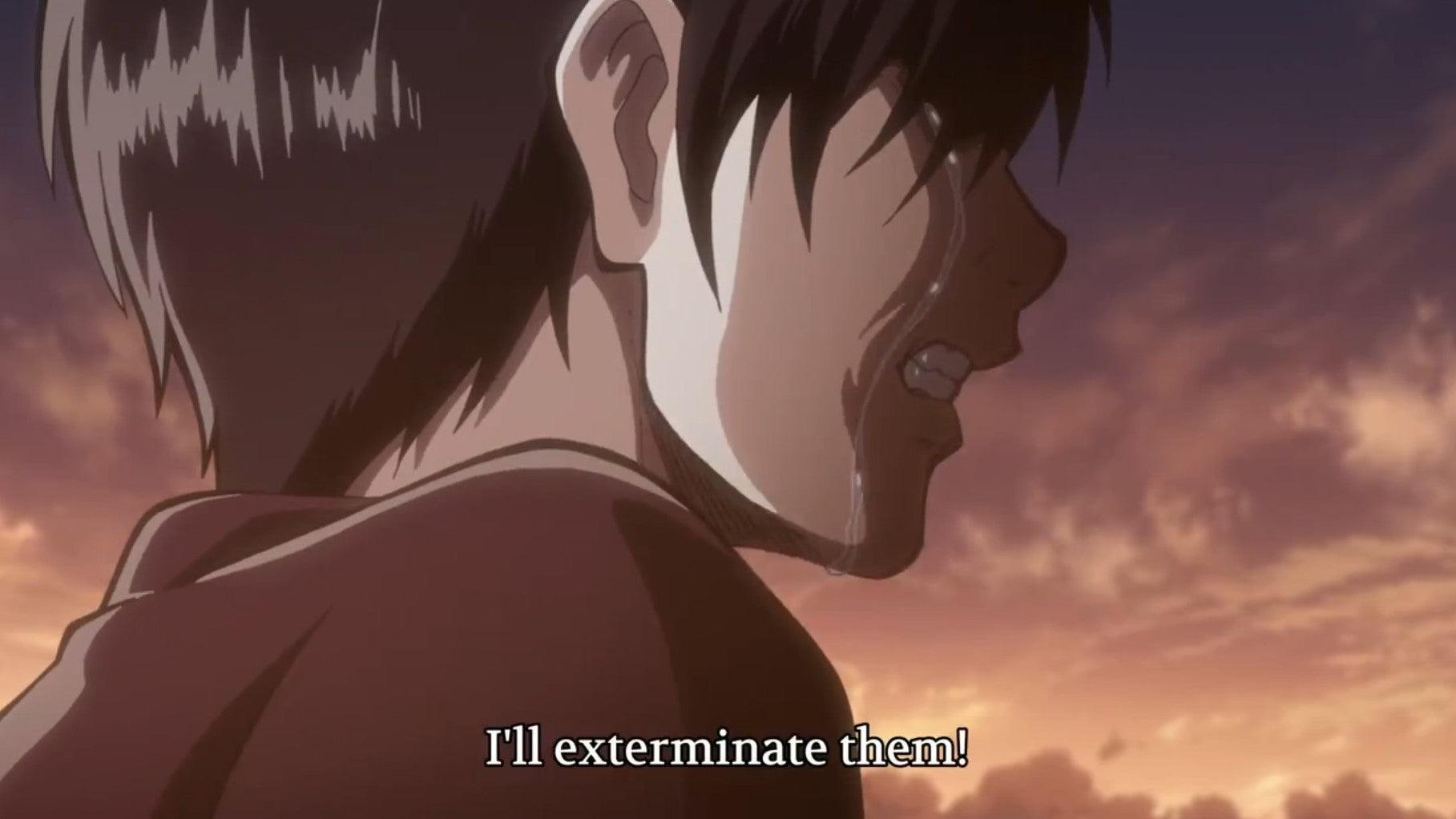
"You have the freedom to defend the world's freedom and I have the freedom to continue moving forward."
- Eren Yeager
Eren, shaped by a tumultuous childhood and oppressive living conditions, underwent a transformative shift in his worldview. His nation existed in constant fear within the confinements of the walls, perpetually threatened by Titans. For the boy, freedom was an elusive concept, and he vowed to go to any lengths to attain it.
As he matured, Eren uncovered the truth about his true adversary and the atrocities committed against the Eldians. Fueled by a deep-seated hatred, he adopted an ideology condemning every nation, except his own, as inherently evil and deserving of annihilation. In pursuit of his goals, he initiated The Rumbling, directing a countless horde of Colossal Titans towards his perceived enemies.
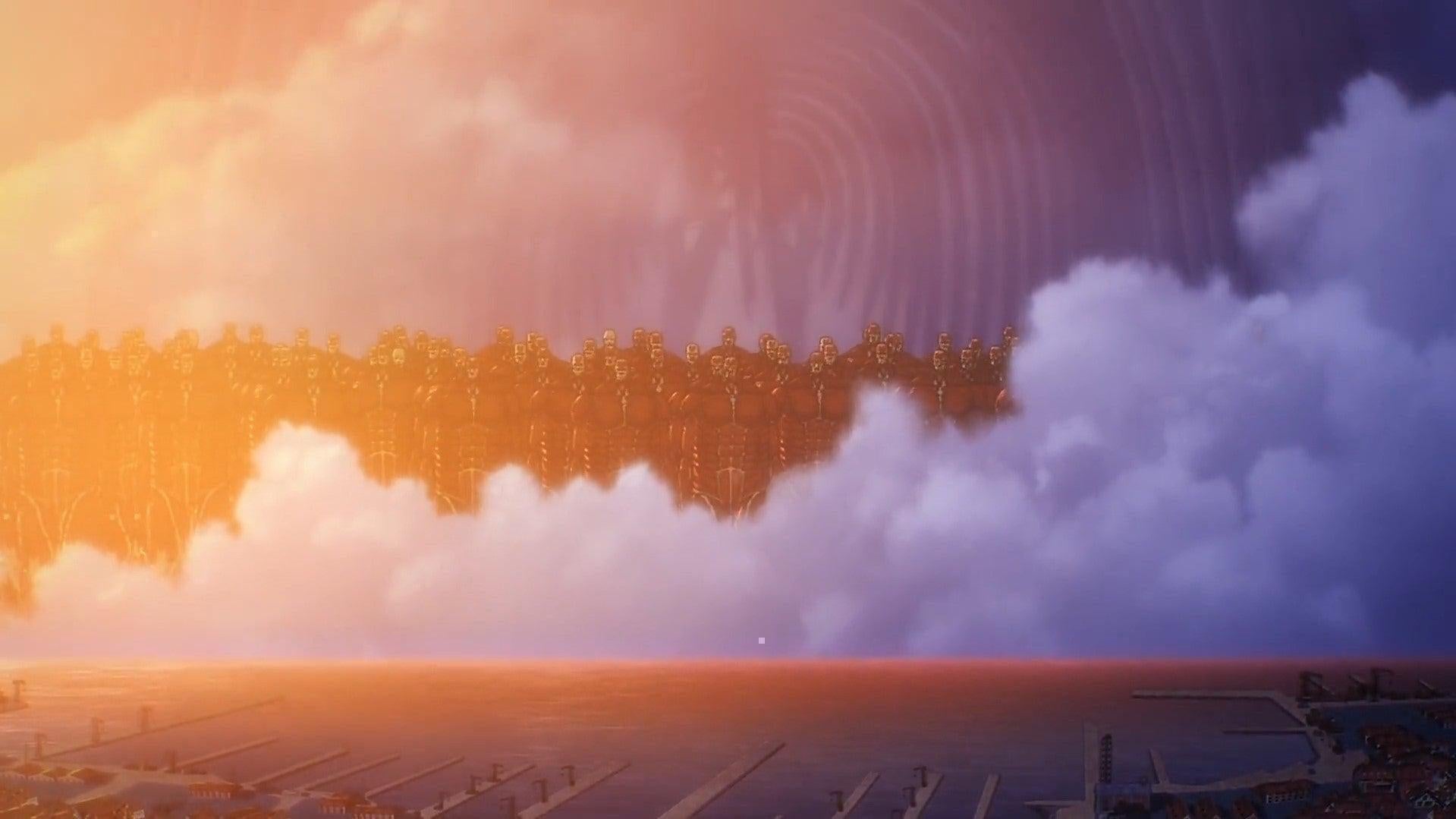
Eren's actions prompt comparisons to the leader of Nazi Germany, infamous for attempting to exterminate the entire Jewish population. The term "genocide" is frequently used within the anime in reference to The Rumbling and sadly, it is also a term frequently invoked in real life in reference to World War II.
Hajime Isayama's unique approach to the show involves not only mirroring the Eldians with the Jewish population but also drawing parallels of the Eldians to the Nazis, particularly through Eren's character and horrific actions and blatant disregard for human life at the end of the series.
Final Thoughts on The Historical Parallels in Attack on Titan
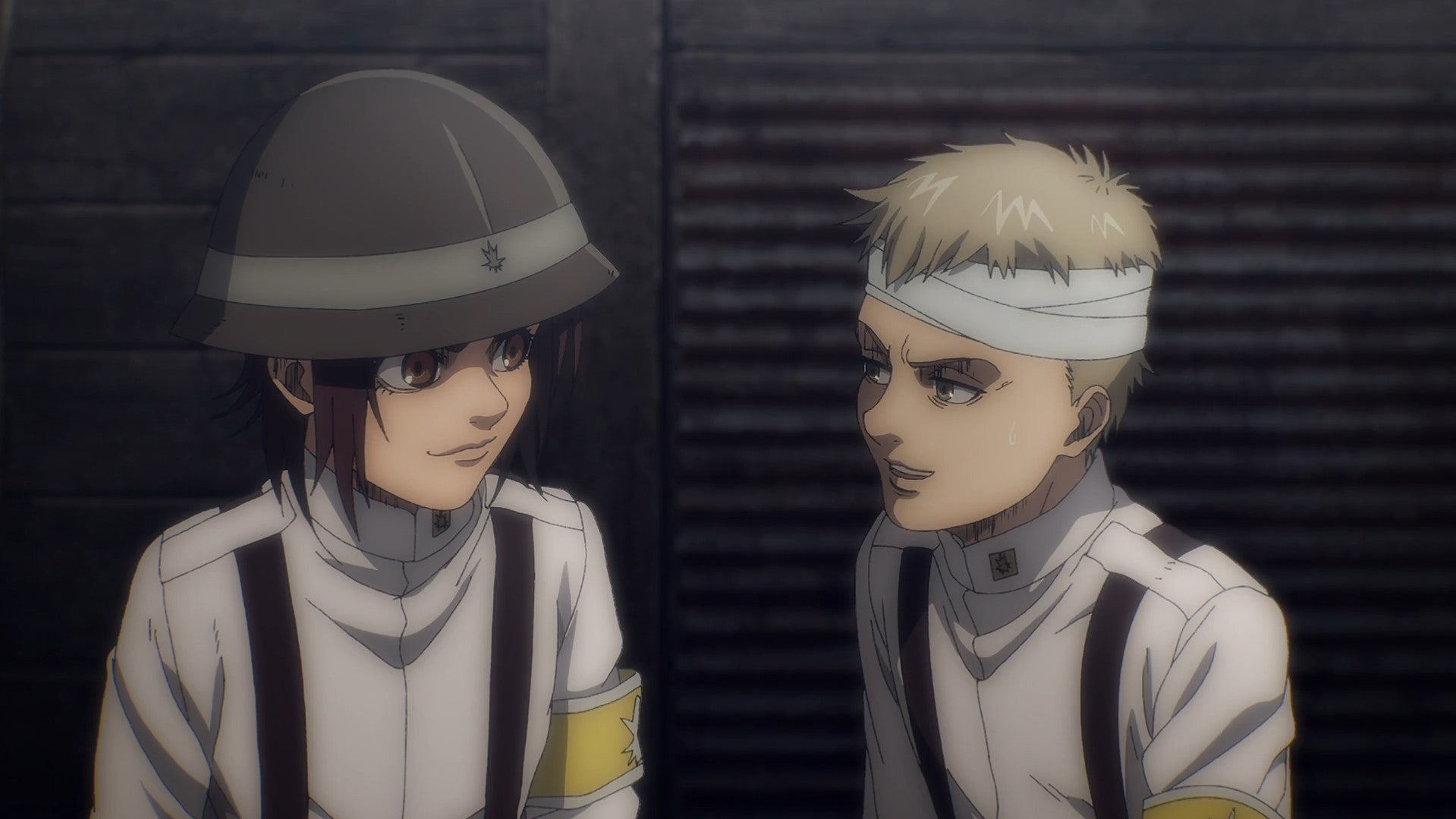
Hajime Isayama drew inspiration from one of the most challenging periods in human history, crafting a manga that stands as a fictional masterpiece. By incorporating parallels to real events, Attack on Titan explicitly opposes fascist ideologies, portraying them as inherently evil.
In contrast to World War II's often straightforward narrative of good versus evil, Attack on Titan introduces nuance through its comparisons of Eldians to both sides. The anime skillfully navigates the complexities of being both victim and offender, contributing to a narrative that transcends a simplistic black-and-white perspective.
These historical elements deepen Attack on Titan's already serious tone, adding layers of complexity to its intricate narrative. Despite its fictional nature, the series adeptly conveys the emotions experienced by both the oppressor and the oppressed, offering a poignant glimpse into the hardships endured by many. The exploration of historical parallels in Attack on Titan not only enriches its storytelling but also serves as a powerful commentary on the enduring impact of tumultuous periods in human history.
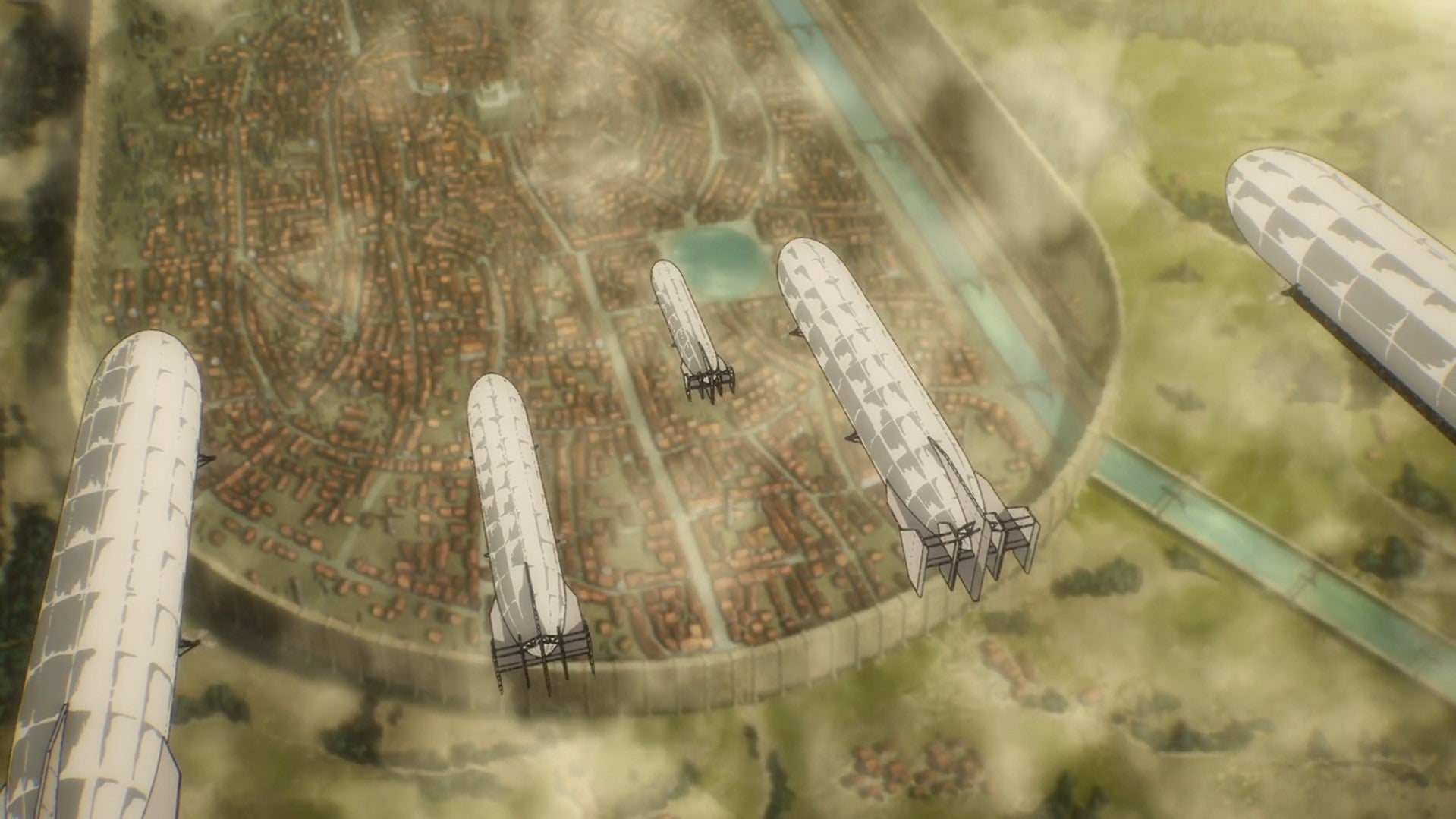
Buy: Attack On Titan Merchandise & Gifts
Buy:Attack On Titan Merchandise & Gifts
FAQ
Is AoT based on WW2?
+While Attack on Titan draws inspiration from historical events, particularly World War II, it remains a fictional story with its own unique narrative. While certain events and elements bear similarities to that historical period, the series is far from a direct retelling of WW2.
Is Attack on Titan anti-semitic?
+No, Attack on Titan is not anti-Semitic. Although it draws inspiration from historical events, it does not promote anti-Semitic ideologies. The story explicitly condemns oppression, and while interpretations may vary, the series is undoubtedly not intended to be anti-Semitic.
What year does Attack on Titan take place?
+Attack on Titan's story commences in the year 845 with the fall of Wall Maria.
Is Attack on Titan a historical anime?
+Attack on Titan diverges from typical historical anime; it draws inspiration from history but prioritizes fiction to create its own unique and interesting story. Real historical parallels and references exist throughout the series to enhance the story's themes.
What is the political symbolism of Attack on Titan?
+Attack on Titan explores authority, twisted ideologies, and the societal impact of excessive power. It delves into complex themes of power and oppression without aligning with a specific political ideology, offering a nuanced examination of society and human nature.
What is the message of Attack on Titan?
+Attack on Titan delves into the message about power, oppression, the endless cycle of war, and the pursuit of freedom. It explores human nature, morality, and consequences of actions, The series offers authentic societal perspectives but still leaving room for interpretation.
Is Eren Yeager the villain in Attack on Titan?
+Starting as a beloved protagonist, Eren's character in Attack on Titan turns morally ambiguous. Seen as a freedom-seeking hero, his actions in The Rumbling, annihilating 80% of humanity, raise concerns about the limits he crossed in pursuit of Eldia's self-defense.







![Attack on Titan [Season 4] - Sasha Pin Badge (Enamel, 2") - Zen Monkey Studios - 10th Anniversary Limited Edition Series](http://poggers.com/cdn/shop/files/Attack-on-Titan-Season-4-Sasha-Pin-Badge-Enamel-2-Zen-Monkey-Studios-10th-Anniversary-Limited-Edition-Series_medium.webp?v=1726747017)


![Attack on Titan [Season 1] - Chibi Characters & Titans Pin Badge Pack - ABYstyle](http://poggers.com/cdn/shop/files/Attack-on-Titan-Season-1-Chibi-Characters-Titans-Pin-Badge-Pack-ABYstyle_medium.webp?v=1716639249)
![Attack on Titan [Season 1] - Chibi Characters & Titans Pin Badge Pack - ABYstyle](http://poggers.com/cdn/shop/files/Attack-on-Titan-Season-1-Chibi-Characters-Titans-Pin-Badge-Pack-ABYstyle-2_medium.webp?v=1716639256)




![Attack on Titan [Season 4] - Chibi Eren Yeager Keychain (PVC) - ABYstyle](http://poggers.com/cdn/shop/files/Attack-on-Titan-Season-4-Chibi-Eren-Yeager-Keychain-PVC-ABYstyle_medium.webp?v=1716724122)
![Attack on Titan [Season 4] - Chibi Eren Yeager Keychain (PVC) - ABYstyle](http://poggers.com/cdn/shop/files/Attack-on-Titan-Season-4-Chibi-Eren-Yeager-Keychain-PVC-ABYstyle-2_medium.webp?v=1716724128)

















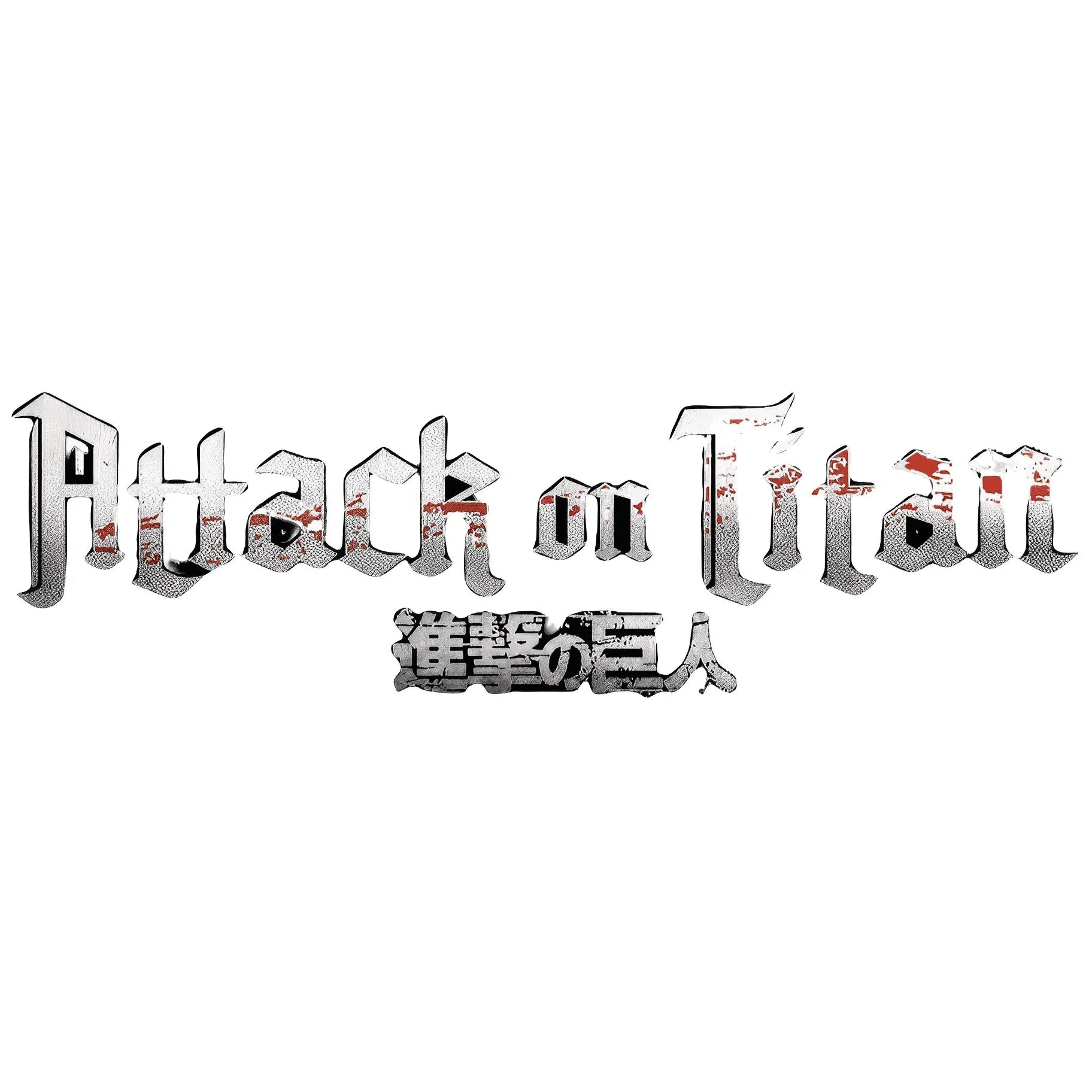
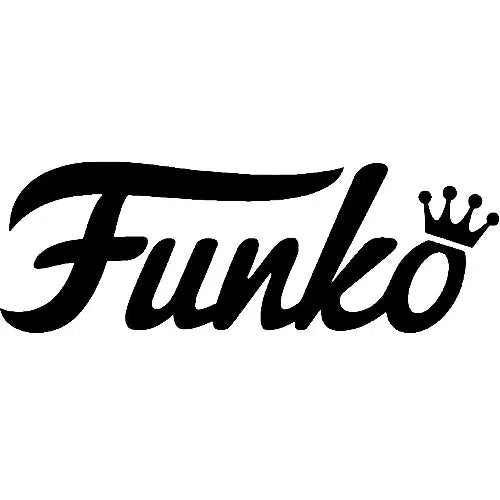


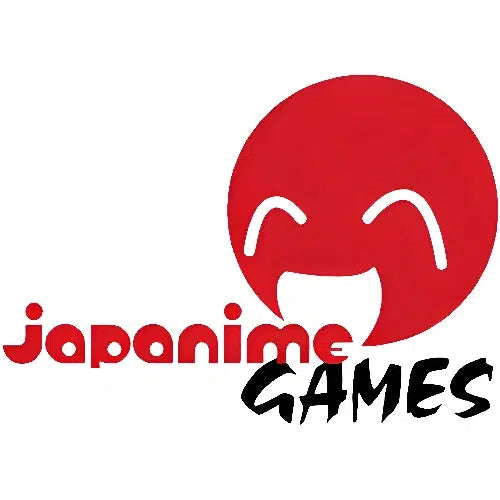


![Attack on Titan [Season 4] - Chibi Eren Yeager Keychain (Acrylic) - ABYstyle](http://poggers.com/cdn/shop/files/Attack-on-Titan-Season-4-Chibi-Eren-Yeager-Keychain-Acrylic-ABYstyle_medium.webp?v=1716724022)
![Attack on Titan [Season 4] - Chibi Eren Yeager Keychain (Acrylic) - ABYstyle](http://poggers.com/cdn/shop/files/Attack-on-Titan-Season-4-Chibi-Eren-Yeager-Keychain-Acrylic-ABYstyle-2_medium.webp?v=1716724028)


![Attack on Titan [Season 4] - Attack Titan Eren vs Marley Mousepad (9.25"x7.75") - ABYstyle](http://poggers.com/cdn/shop/files/Attack-on-Titan-Season-4-Attack-Titan-Eren-vs-Marley-Mousepad-9_25x7_75-ABYstyle_medium.webp?v=1716639195)
![Attack on Titan [Season 4] - Attack Titan Eren vs Marley Mousepad (9.25"x7.75") - ABYstyle](http://poggers.com/cdn/shop/files/Attack-on-Titan-Season-4-Attack-Titan-Eren-vs-Marley-Mousepad-9_25x7_75-ABYstyle-2_medium.webp?v=1716639200)
![Attack on Titan [Season 3] - Levi Standee Figure (Acrylic) - ABYstyle - Acryl Series](http://poggers.com/cdn/shop/files/Attack-on-Titan-Season-3-Levi-Standee-Figure-Acrylic-ABYstyle-Acryl-Series_dba257e9-4211-4d4d-8ef2-1418f8019d8b_medium.webp?v=1716379480)
![Attack on Titan [Season 3] - Levi Standee Figure (Acrylic) - ABYstyle - Acryl Series](http://poggers.com/cdn/shop/files/Attack-on-Titan-Season-3-Levi-Standee-Figure-Acrylic-ABYstyle-Acryl-Series-2_medium.webp?v=1716379486)
![Attack on Titan [Season 3] - Eren Standee Figure (Acrylic) - ABYstyle - Acryl Series](http://poggers.com/cdn/shop/files/Attack-on-Titan-Season-3-Eren-Standee-Figure-Acrylic-ABYstyle-Acryl-Series_6bc04a99-dc4f-4ba3-ae42-ea0c9f1bd13d_medium.webp?v=1716379466)
![Attack on Titan [Season 3] - Eren Standee Figure (Acrylic) - ABYstyle - Acryl Series](http://poggers.com/cdn/shop/files/Attack-on-Titan-Season-3-Eren-Standee-Figure-Acrylic-ABYstyle-Acryl-Series-2_medium.webp?v=1716379472)
![Attack on Titan [Season 4] - Paradis Humans vs Marley Titans Framed Poster (13.5" x 17.5") - ABYstyle](http://poggers.com/cdn/shop/files/Attack-on-Titan-Season-4-Paradis-Humans-vs-Marley-Titans-Framed-Poster-13_5-x-17_5-ABYstyle_medium.webp?v=1716723995)
![Attack on Titan [Season 4] - Eren & The Scout Regiment Framed Poster (13.5" x 17.5") - ABYstyle](http://poggers.com/cdn/shop/files/Attack-on-Titan-Season-4-Eren-The-Scout-Regiment-Framed-Poster-13_5-x-17_5-ABYstyle_medium.webp?v=1716723990)
![Attack on Titan [Season 4] - War for Paradis Boxed Poster Set (20.5"x15") - ABYstyle - Series 2](http://poggers.com/cdn/shop/files/Attack-on-Titan-Season-4-War-for-Paradis-Boxed-Poster-Set-20_5x15-ABYstyle-Series-2_medium.webp?v=1716293273)
![Attack on Titan [Season 4] - War for Paradis Boxed Poster Set (20.5"x15") - ABYstyle - Series 2](http://poggers.com/cdn/shop/files/Attack-on-Titan-Season-4-War-for-Paradis-Boxed-Poster-Set-20_5x15-ABYstyle-Series-2-2_medium.webp?v=1716293279)


















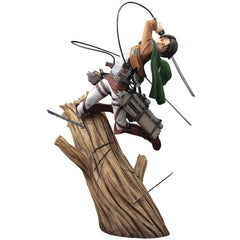





![Attack on Titan: Before the Fall [Volume 1] - Paperback Manga](http://poggers.com/cdn/shop/files/Attack-on-Titan-Before-the-Fall-Volume-1-Paperback-Manga_medium.webp?v=1725536667)
![Attack on Titan: Before the Fall [Volume 1] - Paperback Manga](http://poggers.com/cdn/shop/files/Attack-on-Titan-Before-the-Fall-Volume-1-Paperback-Manga-2_medium.webp?v=1725536672)

Leave a comment